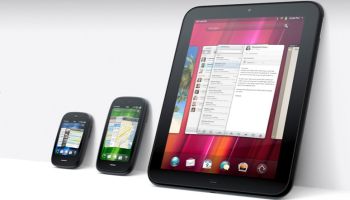MS, Apple And Android Face HP TouchPad Pressure

HP’s has at last revealed its WebOS TouchPad and smartphones which could be mobile game-changers
Hewlett-Packard’s upcoming WebOS TouchPad tablet and two smartphones, due for release sometime this summer, could radically alter an already-dynamic market for mobile devices.
Within minutes of HP’s February 9 unveiling of the three devices, pundits began discussing the company’s chances against Apple’s iPad and iPhone, which remain the market’s dominant devices alongside the growing family of Google Android smartphones and tablets. HP’s new devices use the WebOS operating system, which came along with the other assets inherited during HP’s $1.2 billion acquisition of Palm last summer.
On A Par With Other Dual Core Tablets
 The TouchPad’s specs certainly put it on a par with most of its rivals. The 1.5-pound device offers either 16GB or 32GB of built-in memory, and powers games and applications via its 1.2GHz dual-core Snapdragon processor. It will integrate with a user’s webOS smartphones, which is logical, because HP seems intent on creating a broad ecosystem based on its acquired operating system.
The TouchPad’s specs certainly put it on a par with most of its rivals. The 1.5-pound device offers either 16GB or 32GB of built-in memory, and powers games and applications via its 1.2GHz dual-core Snapdragon processor. It will integrate with a user’s webOS smartphones, which is logical, because HP seems intent on creating a broad ecosystem based on its acquired operating system.
Such an ecosystem, of course, would compete against similar ones being created by Apple, Google and Microsoft. In an interesting side note, freshly minted Nokia CEO Stephen Elop allegedly wrote a memo to employees detailing this new competitive atrategy.
“The battle of devices has now become a war of ecosystems, where ecosystems include not only the hardware and software of the device,” Elop wrote, according to a full text of the memo posted on Engadget, “but developers, applications, e-commerce, advertising, search, social applications, location-based services, unified communications and many other things.”
He added: “Our competitors aren’t taking our market share with devices; they are taking our market share with an entire ecosystem. This means we’re going to have to decide how we either build, [catalyse] or join an ecosystem.”
Circling back to HP, the intention to create a robust software-hardware ecosystem presents a potential challenge to both Google and Apple. However, the latter two companies also have substantial leads over HP in areas such as mobile devices and applications. The company more at risk, at least in the mobile space, is Microsoft, which is rapidly seeking to build out its device ecosystem.
With the launch of Windows Phone 7 late in 2010, Microsoft hoped to reinvigorate its prospects in smartphones, where its market share had been eroding steadily as the Windows Mobile franchise became increasingly antiquated and fragmented. By the end of December, according to research firm comScore, Microsoft’s share of the smartphone market had dipped to 8.4 percent, but it will take several quarters for a clearer picture of Windows Phone 7’s prospects to emerge.
On January 26, Microsoft confirmed with Bloomberg News that approximately two million Windows Phone 7 devices had been sold by manufacturers to retailers, but the number of those that reached consumers’ hands is still unclear.
Meanwhile, Microsoft has little presence in the tablet market. In October, HP released the Slate 500, which runs Windows 7. Questions remain about the exact number produced, however, with Engadget suggesting the manufacturer had initially planned only a limited production run of 5,000 units. Dell is planning to manufacture its own Windows-based tablet which will be a 10-inch model for release later in 2011. Businesses will be the target market for the device.
At this January’s Consumer Electronics Show in Las Vegas, Microsoft’s booth displayed a few Windows tablets, the majority of them aimed at the Asian market. Indeed, CEO Steve Ballmer generally shied away from mentioning tablets during his keynote at the show, focusing instead on Windows laptops with some touch-screen functionality. The next version of Windows will support SoC (system-on-a-chip) architecture, in particular ARM-based systems, which could translate into a greater presence on tablets, but the next version of Windows is almost certainly some time away.
More Pressure On Microsoft Phone 7
 In other words, HP’s new product lines could very well end up pressuring Microsoft’s nascent smartphones, and any attempts in 2011 to expand more broadly into tablets. In addition, HP seems determined to play big in the consumer market.
In other words, HP’s new product lines could very well end up pressuring Microsoft’s nascent smartphones, and any attempts in 2011 to expand more broadly into tablets. In addition, HP seems determined to play big in the consumer market.
HP CEO Leo Apotheker recently told the BBC: “I hope one day people will say ‘this is as cool as HP’, not ‘as cool as Apple’.” If that means his company pours millions of dollars into development and promotion, it could have an effect on Apple and Google, as well as the latter’s manufacturing partners.
HP does face some challenges. It still needs to build a substantial applications ecosystem to compete with Apple’s App Store and Google’s Android Marketplace. And the sheer proliferation of mobile devices means a higher likelihood that the TouchPad and other WebOS products could be lost in the proverbial shuffle.
But as, say, Nokia can attest, the tech game has the ability to change very quickly. HP probably hopes so.